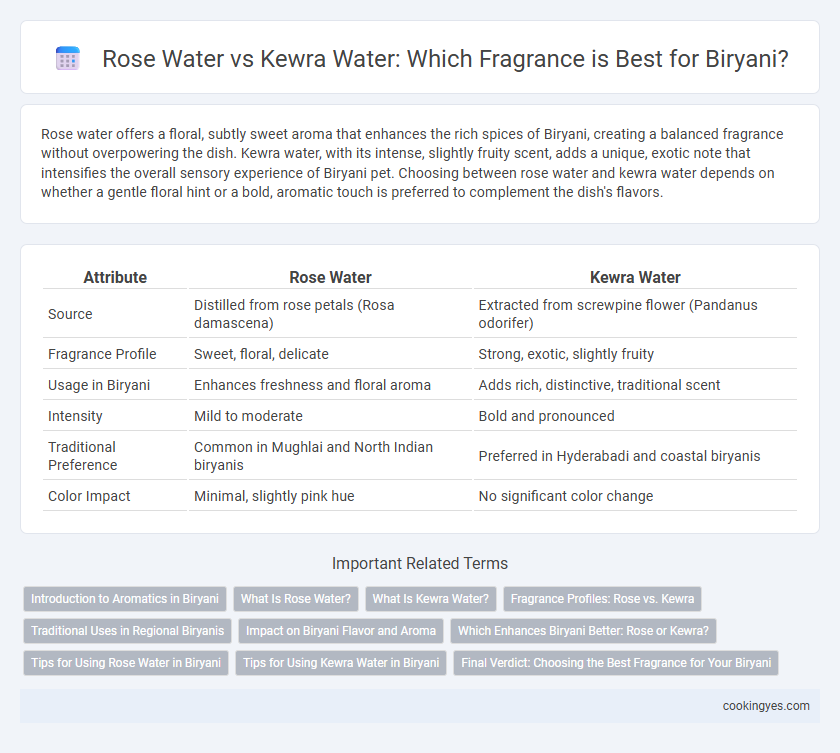Rose water offers a floral, subtly sweet aroma that enhances the rich spices of Biryani, creating a balanced fragrance without overpowering the dish. Kewra water, with its intense, slightly fruity scent, adds a unique, exotic note that intensifies the overall sensory experience of Biryani pet. Choosing between rose water and kewra water depends on whether a gentle floral hint or a bold, aromatic touch is preferred to complement the dish's flavors.
Table of Comparison
| Attribute | Rose Water | Kewra Water |
|---|---|---|
| Source | Distilled from rose petals (Rosa damascena) | Extracted from screwpine flower (Pandanus odorifer) |
| Fragrance Profile | Sweet, floral, delicate | Strong, exotic, slightly fruity |
| Usage in Biryani | Enhances freshness and floral aroma | Adds rich, distinctive, traditional scent |
| Intensity | Mild to moderate | Bold and pronounced |
| Traditional Preference | Common in Mughlai and North Indian biryanis | Preferred in Hyderabadi and coastal biryanis |
| Color Impact | Minimal, slightly pink hue | No significant color change |
Introduction to Aromatics in Biryani
Rose water and kewra water are essential aromatics that elevate the fragrance profile of biryani, imparting distinct floral notes. Rose water offers a sweet, soothing aroma with hints of fresh petals, while kewra water provides a more intense, pandan-like scent rich in fruity and spicy undertones. Both are traditional flavor enhancers used in different regional biryani recipes to create a captivating sensory experience.
What Is Rose Water?
Rose water is a fragrant liquid made by distilling rose petals, often used in biryani to impart a delicate floral aroma that enhances the dish's overall sensory experience. It contains natural compounds like citronellol and geraniol, which contribute to its sweet, fresh scent, making it distinct from kewra water's more complex, fruity fragrance. Rose water's subtlety and floral notes make it a preferred choice for those seeking a gentle yet aromatic touch in their biryani recipes.
What Is Kewra Water?
Kewra water is a fragrant distillation derived from the flowers of the pandanus tree, widely used in biryani to impart a sweet, floral aroma that enhances the dish's traditional fragrance. Unlike rose water, which has a delicate, rosy scent, kewra water offers a more intense, exotic note that pairs well with the rich spices in biryani. Its unique aromatic profile makes kewra water a preferred choice in many authentic biryani recipes across South Asia.
Fragrance Profiles: Rose vs. Kewra
Rose water imparts a delicate, sweet floral aroma with subtle hints of freshness, enhancing biryani's fragrance with a gentle, romantic touch. Kewra water offers a more intense, exotic scent characterized by rich, fruity, and slightly spicy notes that add depth and complexity to the dish. Choosing between rose and kewra water depends on whether a lighter, fragrant floral accent or a robust, aromatic intensity is desired in the biryani.
Traditional Uses in Regional Biryanis
Rose water and kewra water are essential aromatic ingredients traditionally used in regional biryanis to enhance fragrance and flavor. Rose water is predominantly favored in Mughlai and Awadhi biryanis for its subtle floral aroma that complements the rich spices, while kewra water is preferred in Hyderabadi biryani for its distinctive sweet and fragrant notes derived from the pandanus flower. Both waters are integral to authentic biryanis, with their use varying by cultural preference and regional culinary heritage.
Impact on Biryani Flavor and Aroma
Rose water imparts a subtle floral sweetness that enhances biryani's aroma with a delicate, fragrant profile, making the dish feel lighter and more refreshing. Kewra water delivers a stronger, more pungent scent with a hint of fruity and earthy notes, intensifying the biryani's flavor complexity and providing a richer aromatic experience. The choice between rose water and kewra water significantly influences the final sensory appeal, with rose water offering softness and kewra adding depth to the biryani's taste and smell.
Which Enhances Biryani Better: Rose or Kewra?
Kewra water enhances biryani better by imparting a distinct floral aroma that complements the spices and saffron, creating a richer sensory experience. Rose water offers a subtler fragrance, adding a gentle sweetness that can sometimes be overshadowed by the robust flavors of biryani. For a more pronounced and traditional biryani aroma, kewra water remains the preferred choice among chefs and culinary experts.
Tips for Using Rose Water in Biryani
Rose water enhances biryani with a subtle floral aroma that balances spices without overpowering the dish, making it ideal for delicate flavor profiles. Use a few drops of high-quality rose water towards the end of cooking to maintain its fragrant freshness and avoid bitterness. Incorporating rose water sparingly ensures a pleasant fragrance that complements saffron and cardamom, key ingredients in traditional biryani recipes.
Tips for Using Kewra Water in Biryani
Kewra water imparts a distinct floral aroma that elevates the flavor profile of biryani, making it a preferred choice over rose water for authentic Indian dishes. Use kewra water sparingly, typically a few drops added towards the end of cooking or during the layering process, to avoid overpowering the dish. To maximize its fragrant effect, combine kewra water with saffron-infused milk or ghee for a rich, aromatic biryani experience.
Final Verdict: Choosing the Best Fragrance for Your Biryani
Rose water imparts a subtle, floral aroma that enhances the richness of biryani without overpowering other spices, making it ideal for delicate, fragrant blends. Kewra water delivers a more intense, sweet, and slightly fruity fragrance, perfect for biryanis that require a bold and distinct aroma. The final verdict depends on whether a milder or a stronger floral scent is preferred, with rose water favored for subtlety and kewra water suited for pronounced fragrance.
Rose water vs Kewra water for fragrance Infographic

 cookingyes.com
cookingyes.com